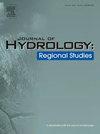LH-moment-based regional flood frequency analysis framework to determine design floods in Krishna River basin
IF 4.7
2区 地球科学
Q1 WATER RESOURCES
引用次数: 0
Abstract
Study region
Krishna River basin, India
Study focus
There have been limited efforts to develop the LH-moment-based Regional Flood Frequency Analysis (RFFA) framework for Indian catchments. In this study, the LH-moment-based RFFA is used to determine flood quantiles at ungauged sites within the Krishna River basin in India, corresponding to various return periods. Three probability distributions, namely the generalized extreme value (GEV), generalized logistic (GLO), and generalized Pareto (GPA) are considered for performing the RFFA.
New hydrological insights for the region
This study examines two cases for RFFA, viz., the first involves a single region comprising all 24 gauges within the basin, while the second divides the 24 gauges into three hydrologically similar regions based on the global K-means (GKM) clustering algorithm. The discordancy and heterogeneity measures are considered for the screening of the peak flow data and checking the heterogeneity of the formed regions, respectively. The performance of the LH-moment-based RFFA framework is evaluated through the Leave-One-Out Cross-Validation (LOOCV) experiment. In the case of single region, GEV distribution is found to be the most suitable regional distribution, while in the second case, the GEV{GEV}[GPA] is identified as the best-fitted regional distribution for the region 1{2}[3]. Overall, the study demonstrates the efficacy of the higher-order LH-moment-based RFFA framework over the L-moment.
求助全文
约1分钟内获得全文
求助全文
来源期刊

Journal of Hydrology-Regional Studies
Earth and Planetary Sciences-Earth and Planetary Sciences (miscellaneous)
CiteScore
6.70
自引率
8.50%
发文量
284
审稿时长
60 days
期刊介绍:
Journal of Hydrology: Regional Studies publishes original research papers enhancing the science of hydrology and aiming at region-specific problems, past and future conditions, analysis, review and solutions. The journal particularly welcomes research papers that deliver new insights into region-specific hydrological processes and responses to changing conditions, as well as contributions that incorporate interdisciplinarity and translational science.
 求助内容:
求助内容: 应助结果提醒方式:
应助结果提醒方式:


